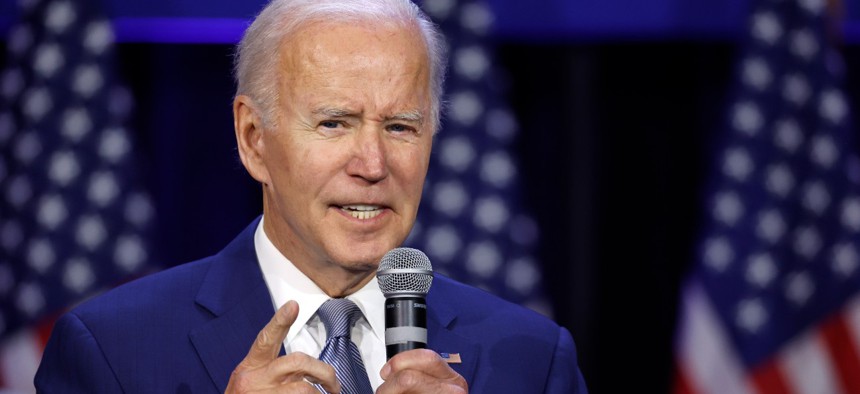
President Biden issued an executive order aimed at improving contraceptive coverage for federal workers, members of the military and Americans enrolled in Medicare, Medicaid or health care plans on Affordable Care Act marketplaces. Anna Moneymaker/Getty Images
A gender equity group still wants better protections for feds who need abortion care
One year after the Dobbs decision, President Biden signed a new executive order potentially expanding contraceptive access for federal workers, but a gender equity group at the Justice Department says more needs to be done.
A federal employee group within the Justice Department on Thursday revived its call for the Biden administration to take more concrete steps to help federal workers in some states more easily obtain abortion care as the anniversary of the overturning of Roe v. Wade approaches.
Saturday marks the one-year anniversary of Dobbs v. Jackson Women’s Health Organization, the controversial Supreme Court decision that overturned nearly 50 years of precedent and eliminated the constitutional protection for abortion, allowing states to regulate the procedure as they see fit. Shortly after the decision, more than a dozen states banned the procedure in most cases.
In a letter to President Biden and other members of the administration Thursday, the Department of Justice Gender Equality Network, an employee association representing around 1,300 workers at the Justice Department, reiterated its calls for the White House to make it easier for federal workers in states where abortion has been curtailed post-Roe to travel across state lines to receive abortion-related care.
“In the year since the Supreme Court eliminated the constitutional right to abortion in Dobbs v. Jackson Women’s Health Organization, countless pregnant employees have relied on their employers to subsidize their travel to other states, cover their medical costs and provide designated paid time off so they can access the abortion care they need,” wrote board member Jen Swedish and acting president Colleen Phillips. “But, despite the federal government’s efforts to respond to this health care crisis, the administration has provided no support to the nearly 2 million federal civilian employees and their families who live in states where abortion is illegal or likely will be soon.”
The group asked the administration to provide administrative leave to cover the time it takes for feds who need to travel for abortion care and to offer allowances to help them pay for the costs of travel. It also asked federal agencies to allow federal employees to opt out of travel or relocation to states that have banned abortion, as well as prevent the use of information related to an employee or job applicant’s receiving abortion care during background investigations both in the hiring process and as part of obtaining a security clearance.
And the employees urged the Biden administration to push to end the ban on abortion coverage in the Federal Employees Health Benefits Program via the Hyde amendment, the annual policy rider in appropriations legislation that bars federal dollars from being used on abortion care.
Swedish and Phillips said providing benefits like leave and travel allowances to federal employees to seek abortion care would be a logical next step after the administration moved to perform abortion services on military bases and at the Veteran Affairs Department.
“With the exception of the Department of Justice, our recommendations . . . have been met with silence from the administration,” they wrote. “In the meantime, the Department of Defense announced measures to help military service members and their families obtain abortion care, so we know there is more the administration can do for civil servants.”
Swedish told Government Executive that the Justice Department has “engaged” with her organization on the issues of leave and covering travel costs, although that has not yet led to a policy change on the issue.
“They’ve spoken with us about our asks and tried to understand what is within their capacity within the department alone to act, recognizing that some of our asks are limited to other agencies, like the Office of Personnel Management,” she said. “But the department has engaged with us and [officials] are thinking through these issues with us. We really appreciate their attention to these issues.”
On Friday, Biden issued a new executive order aimed at improving contraceptive coverage for federal workers, members of the military and Americans enrolled in Medicare, Medicaid or health care plans on Affordable Care Act marketplaces. But Swedish said that measure still does not address federal workers who require abortion care in states with bans on the procedure.
“The executive order is the first time this administration has addressed the reproductive health needs of federal employees, but it’s limited to contraceptives, while our asks are limited to abortion care,” she said. “It’s a step in the right direction, but it doesn’t reach as far as we’d like them to go.”
Swedish acknowledged that the challenge of eliminating the Hyde amendment is daunting, particularly with Republicans in control of the House. But she said the White House can do more to advocate for its removal from the appropriations process.
“The process starts with the president’s budget,” she said. “[Biden’s fiscal 2024] budget came out excluding the Hyde amendment from Medicaid, but it still included the ban on abortion coverage for the FEHBP, and our letter points out that there is more within the administration’s power to do. So when the administration is crafting its 2025 budget, it can eliminate that ban for federal employees, although we recognize that in order to implement it, it requires Congress.”







